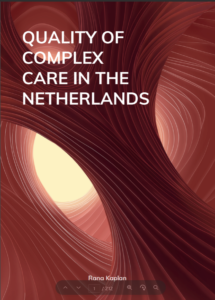PhD Defence Rana Kaplan
This thesis evaluates the quality of complex care in the Netherlands and explores predictive models to enhance care efficiency, focusing on acute myeloid leukemia (AML), metastatic non-small cell lung carcinoma (NSCLC), acute oncological care, and high-need, high-cost (HNHC) patients. Using data from the Netherlands Cancer Registry, Chapters 2–4 reveal persistent regional disparities in NSCLC diagnostics and AML treatment with intensive remission induction chemotherapy (ICT), despite increased adoption over time.
Structural aspects of complex care were examined through quantitative and qualitative methods. Chapter 5 highlights the association between higher ICT patient hospital volume and reduced mortality risk. However, Chapter 6 emphasizes that implementing structural changes requires a careful, structured approach that builds upon the existing system.
Finally, Chapters 7–9 present predictive models designed to improve care efficiency for complex care patients. These models demonstrate the potential to serve as case identifiers, ensuring that patients receive care tailored to their needs.
In conclusion, this thesis finds that the quality of complex care in the Netherlands can be significantly enhanced by reducing practice variation, implementing structural changes with consideration, and integrating predictive models into routine clinical practice. These advancements could be realized through the adoption of a learning healthcare system—an approach characterized by continuous, transparent, and adaptive improvement, wherein information technology is used to measure and enhance healthcare quality.
